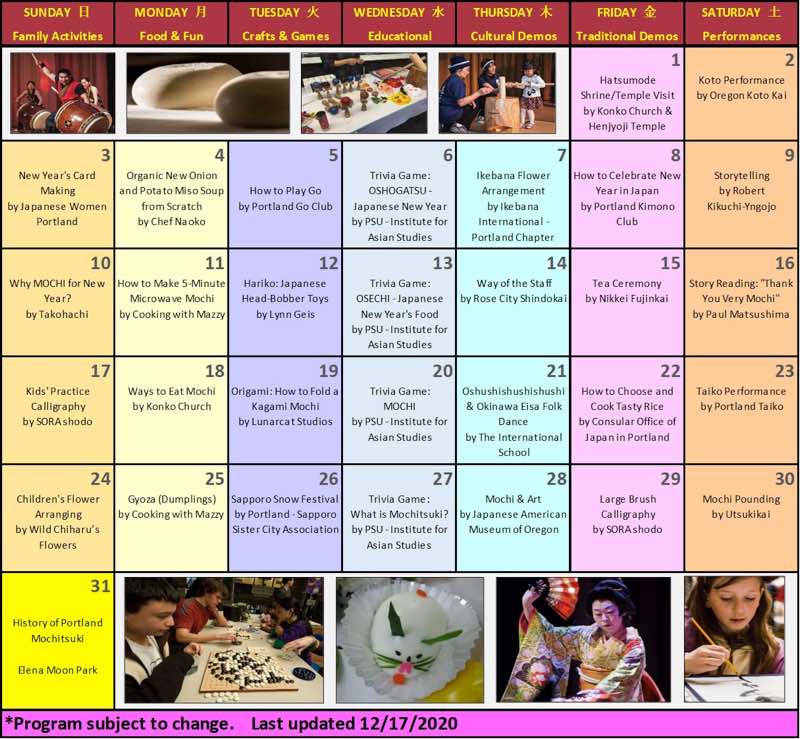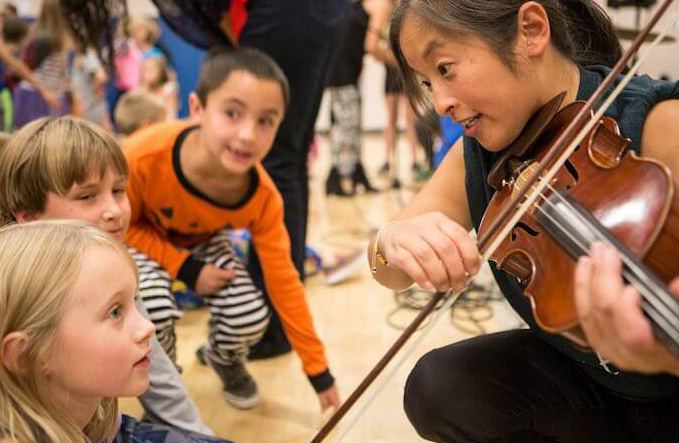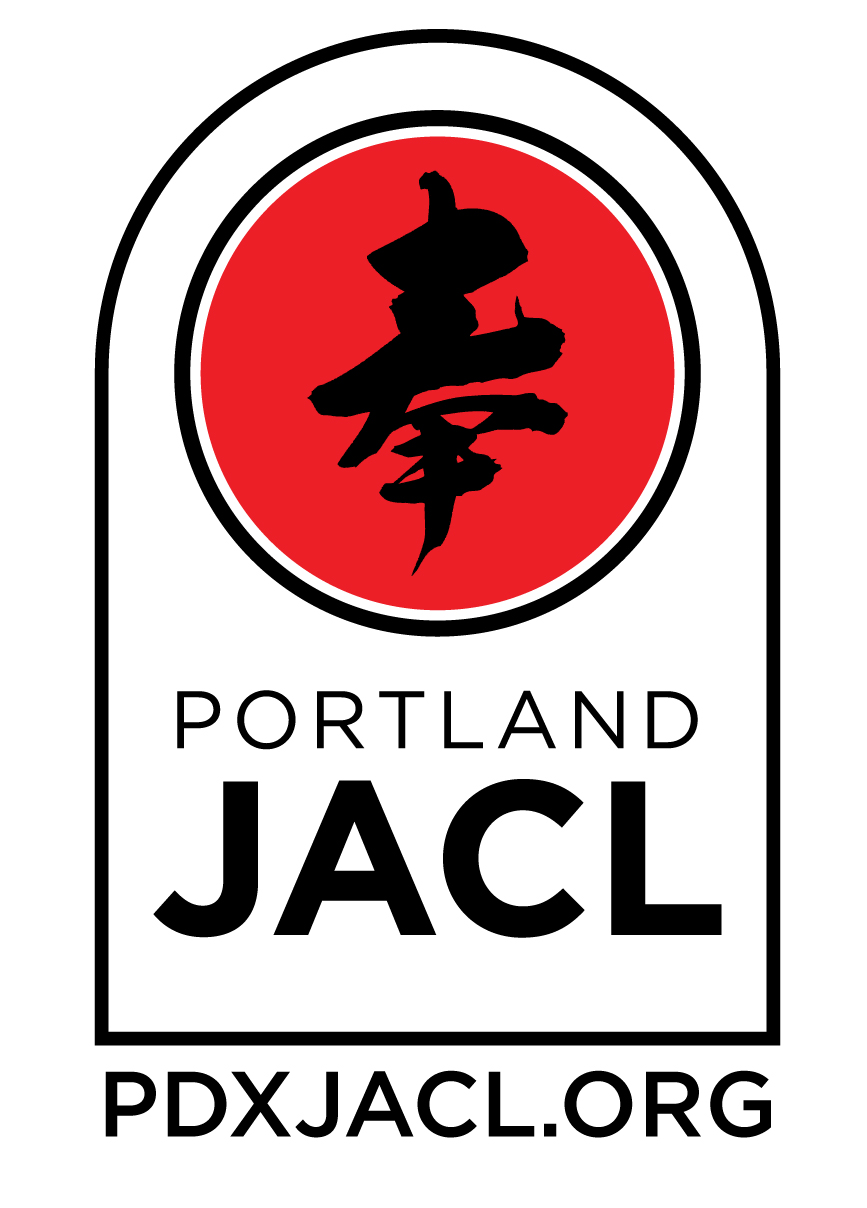Students who are members or have parents who are members of one of the sponsoring Nikkei organizations by November 14, 2020 are eligible to apply for a 2021 scholarship: Buddhist Henjyogi Temple, Epworth United Methodist Church, Gresham-Troutdale JACL, Japanese Ancestral Society, Japanese Woman’s Society, Nichiren Buddhist Temple, Oregon Nisei Vets, Portland JACL, Shokookai or Veleda. Each organization has its own membership criteria. More than 10 scholarships are awarded annually. Scholarship applications are reviewed by a committee from the Japanese Ancestral Society that includes members from other organizations offering scholarships. Thank you to the organizations, donors and families who make these scholarships possible.
Students or have parents who are members of one of the sponsoring organizations are also eligible to apply for the Henjyogi Temple Art Award, which is a separate application, is due March 5.
In addition, students who are members of the JACL are eligible to apply for the National JACL Scholarship. Entering freshman applications are due on-line on March 1. Application for undergraduate, graduate, law, art and performing arts and financial aid is due April 1.
What is HR 40?
House Resolution 40, or Commission to Study and Develop Reparation Proposals for African-Americans Act, is federal legislation currently in the House of Representatives. This piece of legislation is a study commission, like the Commission on Wartime Relocation and Internment of Civilians. If passed, the legislation would form a commission to study slavery and discrimination against African Americans from 1619 (when 20 enslaved Africans arrived in the English colony of Virginia) until today. The commission would also recommend appropriate remedies for the federal government to take. The commission would be tasked to:
Look at the role that federal and state government played in supporting slavery
Look at discrimination against slaves and their descendants
Look at the ongoing negative effects of slavery on African Americans and society today
You can click here to read the full text of the legislation.
The ACLU has put together more information on HR 40, you can click here to learn more.
Why are we collecting testimony from Japanese Americans?
In mid-February, the House Judiciary Subcommittee on Constitution, Civil Rights, and Civil Liberties is going to have a hearing about HR 40. Congressional members and supporting organizations, led by the National African American Reparations Commission (NAARC) and the American Civil Liberties Union (ACLU), have asked for Japanese Americans ? especially survivors of incarceration and those who were involved in the Redress Movement ? to write testimony in support of HR40 to 1) inform representatives as they prepare for this hearing and 2) to enter into the official Congressional record, which will be reprinted and preserved for historical purposes.
?What I?m talking about is more than recompense for past injustices?more than a handout, a payoff, hush money, or a reluctant bribe. What I?m talking about is a national reckoning that would lead to spiritual renewal.? ? Ta-Nehisi Coates
You can click here to read ?The Case for Reparations? by Ta-Nehisi Coates
The Japanese American community is a diverse and multiracial community. There are many Black-Nikkei individuals and families who are descendants of enslaved people and who have experienced the ongoing negative effects of U.S. slavery and its aftermath embedded in the racism, anti-Blackness, and structural inequities of U.S. society.
You can click here to read a Washington Post story about a Black-Nikkei family?s thoughts on this topic here.
As the only ethnic group to have received an apology and reparations from the federal government for wrongs committed against us, Japanese Americans have a moral imperative to support the Black people seeking a similar path for a structural remedy. We also have moral authority to stand in solidarity with other communities: especially a community targeted by historic racism seeking accountability and a process for redress and reparations. The violence of slavery, Jim Crow, and ongoing anti-Blackness is so central to the history of the United States that we must all participate in the process of repair.
There are lots of questions that are still unanswered about reparations for the African American community, just as there were lots of questions that faced the Japanese American community during redress. HR 40 deserves our support because it creates a legislative process ? one much like the one our community successfully pushed for ? that will consider many voices and clarify a path forward for repair and the healing that needs to take place.
What should you include in your testimony?
Your written testimony is a statement that will be entered into the U.S. Congressional record as part of the mid-February hearing on HR 40.
It can be of any length, but we recommend keeping it to three pages or less. We hope that it will express your strong belief in support of the creation of a Commission to explore redress and reparations for Black Americans and that you will draw upon your personal and family history as moral authority to make your statement.
Please include the following:
Your name
Your city and zip code
Date
An explicit statement that you support HR 40. (This can be as simple as saying, ?I support HR 40.?)
An explanation of why you, as a Japanese American, support HR 40. We suggest you include responses to the following questions:
Tell the congressional committee about yourself! Were you incarcerated in one of the World War II WRA/DOJ camps? Were other members of your family? Which camp(s)? Where do you live now?
What were the short and long term consequences of incarceration for you and your family?
Tell the congressional committee about your connection to the Redress Movement!
Did you or your family participate in a CWRIC hearing? What was the impact of hearing those testimonies?
Why was redress important to you and your family? This can include the apology, the individual payments, or other federal funding like the JACS grant program.
How did the Redress Movement impact the healing of you, your family, the Japanese American community, or the country as a whole?
Why do you support HR 40?
For example, you may want to explain how slavery, Jim Crow, and anti-Blackness have inflicted intergenerational harms on African Americans. You may want to connect reparations for African Americans to your own history as a Japanese American. Or you may want to explain this in terms of our duty to speak out as Japanese Americans. It?s up to you!
Include your signature.
Logistical Questions
Please email your testimony to tsuruforsolidarity@gmail.com by Friday, February 12th at 12pm PST. In your email, please include your name, address, and other contact information so it can be shared with congressional staff if needed.
For more information, please go to www.tsuruforsolidarity.org/HR40
Biden Combats Anti-Asian Sentiment
Advancing inclusion and belonging for people of all races, national origins, and ethnicities is critical to guaranteeing the safety and security of the American people. During the coronavirus disease 2019 (COVID-19) pandemic, inflammatory and xenophobic rhetoric has put Asian American and Pacific Islander (AAPI) persons, families, communities, and businesses at risk.
The Federal Government must recognize that it has played a role in furthering these xenophobic sentiments through the actions of political leaders, including references to the COVID-19 pandemic by the geographic location of its origin. Such statements have stoked unfounded fears and perpetuated stigma about Asian Americans and Pacific Islanders and have contributed to increasing rates of bullying, harassment, and hate crimes against AAPI persons. These actions defied the best practices and guidelines of public health officials and have caused significant harm to AAPI families and communities that must be addressed.
For Immediate Release
David Inoue, Executive Director dinoue@jacl.org and Sarah Baker, VP Public Affairs sbaker@jacl.org.
Today we have seen the culmination of months of seditious rhetoric from the President and his supporters. For too long white supremacy and hate have gone unchecked in our nation; there can be no other word for what has happened today with the storming of the Capitol than treason. These heinous acts, encouraged and supported by our President, should not go unpunished – Congress must immediately begin the process of impeachment and removal of the President of the United States for acts of sedition.
On this day, Congress was supposed to certify the electoral college votes, confirming President-Elect Biden as the next President of the United States. Instead, right-wing terrorists desecrated the Capitol with violence and menacing intent. Law enforcement was not prepared for this situation and their restraint today is in stark contrast to the abhorrent treatment of Black Lives Matter protestors during the summer. What we have seen today at our Nation?s Capitol is not only an affront to our democracy, but it sends a clear message to our fellow Americans and the rest of the world that the United States truly does not value Black lives. This is the epitome of white privilege.
JACL emphasizes the importance and the power of words and calls upon the media to report on the situation accurately. These are not protestors; these are violent white supremacist terrorists. To refer to them as protestors denigrates those who engage in legitimate peaceful protest. Social media networks must also crack down on hate groups that have been using these outlets to openly plan the violent acts that have unfolded today.
December Newsletter Delayed
The December issue of the Portland JACL newsletter was mailed on December 1. Unfortunately people have just been getting the newsletter on December 28. We are still mailing paper newsletters this month so this was not the official start of our e-newletter. Don’t forget to let us know if you would like to continue to receive the newsletter in the mail with a suggested annual donation of $25 to cover the cost of printing and mailing. You can let us know at PO Box 86310; Portland, Or 97286 or you can go to “Contact Us” on this website.
Mochitsuki

Everyday for the month of January, the activity scheduled for the day will be available on the Mochitsuki website at mochipdx.org. You can access the video anytime after it is posted. Our only live program will be the music and panel discussion with Elena Moon Park on January 31st at 1 p.m.
January
1 Hatsumode Shrine/Temple Vist by Konko Church and Henjyogi Temple
2 Koto Performance by Oregon Koto Kai
3 New Year’s Card Making by Japanese Women Portland
4 Organic New Onion and Potato Miso Soup from Scratch by Chef Nakao
5 How to Play Go by Portland Go Club
6 Trivia Game: Oshogatsu-Japanese New Year by PSU Institute for Asian Studies
7 Ikebana Flower Arrangement by Ikebana International-Portland Chapter
8 How to Celebrate New Year in Japan by Portland Kimono club
9 Storytelling by Robert Kikuchi-Yngojo
10 Why MOCHI for the New Year? by Takohachi
11 How to Make a 5-Minute Microwave Mochi by Cooking with Mazzy
12 Hariko: Japanese Head Bobber Toys by Lynn Geis
13 Trivia Game: OSECHI-Japanese New Year’s Food by PSU-Institute for Asian Studies
14 Way of the Staff by Rose City Shindokai
15 Tea Ceremony by Nikkei Fujinkai
16 Story Reading: “Thank You Very Mochi” by Paul Matsushima
17 Kids Practice Calligraphy by SORA shodo
18 Ways to Eat Mochi by Konko Church
19 Origami: How to Fold a Kagami Mochi
20 Trivia Game: MOCHI by PSU-Institute of Asian Studies
21 Oshushishushishushi and Okinawa Elsa Fold Dance by International School
22 How to Choose and Cook Tasty Rice by Consular Office of Japan in Portland
23 Taiko Performance by Portland Taiko
24 Children’s Flower Arranging by Wild Children’s Flowers
25 Gyoza (dumplings) by Cooking with Mazzy
26 Sapporo Snow Festival by Portland Sapporo Sister City Association
27 Trivia Game: What is Mochitsuki? by PSU-Institute for Asian Studies
28 Mochi and Art by Japanese American Museum of Oregon
29 Large Brush Calligraphy by SORA shodo
30 Mochi Pounding by Utsukikai
31 History of Portland Mochitsuki
Live musical performance and panel discussion with Elena Moon Park at 1 p.m.
Mochitsuki Headliner
Elena Moon Park is a classical trained musician, educator, and producer. She is co-Artistic Director of the Brooklyn-based arts organization Found Sound Nation, which uses collaborative music creation to connect people. She has found that working collaboratively is an effective way to tap the hidden potential of our communities and supports social justice.
Elena was born East Tennessee but both of her parents immigrated to the United States from South Korea in their mid-twenties. As a Korean American, she had a limited connection to her cultural background since
she lived in a small southern town with few Asian Americans. She felt disconnected from her Korean roots and has used folk music to explore her own story and ancestral heritage.

Elena will present special New Year?s and Japanese songs for this year?s Mochitsuki event on January 31 at 1pm. Please join us for this live virtual event on the Mochitsuki website.
For Immediate Release
David Inoue, Executive Director dinoue@jacl.org, 202-607-7273
Sarah Baker, VP Public Affairs sbaker@jacl.org
In an announcement made on August 3, the Census Bureau discussed the remaining schedule for the 2020 Census, briefly mentioning that it would cut short its deadline to end census counting. This new deadline brings the end of Census outreach and self-response from October 31, 2020, to September 30, 2020, a month shorter than previously agreed upon by both Congress and the Administration. This is an egregious decision that will leave millions of people uncounted and is a further continuation of the Administration?s attempt to undermine the Census.
This is only the latest in several past attempts by the Administration to change the way in which the Census will consider counting people. The first attempt was the inclusion of a citizenship question that many feared would be used against undocumented immigrants. After the Supreme Court ruled against the inclusion of such a question, the Administration announced a Presidential Memorandum proposing to exclude undocumented immigrants as people in congressional redistricting. The pandemic has already made it difficult to get an accurate count; these additional attempts to change guidelines and rules makes it even harder.
With so much at stake for underrepresented communities, and especially as we cope with COVID-19, an accurate Census count is more important than ever. Currently, the response numbers are already the lowest they?ve ever been, with a national average of only 62.9%, compared to 63.5% in 2010. In rural and tribal communities the numbers are even lower, and in large cities with high populations of communities of color, they are lower still. Census enumerators will have more communities and households to visit than before. With in-person outreach being so important to disenfranchised communities, an earlier end date means millions of people who are at risk of never being counted.
Congress must act to ensure that the 2020 Census reflects an accurate count and portrait of all of America, to ensure that communities that need support receive it over the next decade. This would be important at any given time, but even more so now as we envision our country and its needs with the long-term effects of this pandemic.
There are fewer than 100 days until the 2020 Presidential Election and with the mournful passing of civil rights icon Congressman John Lewis, we wanted to begin our efforts for voter engagement with Representative Lewis? own words?
“My dear friends: Your vote is precious, almost sacred. It is the most powerful nonviolent tool we have to create a more perfect union.?

This champion of our voting rights compels every eligible voter to register and then vote in this upcoming election. You can check here to see if you are registered. You can update your voter information from this section of the Oregon Secretary of State website, as well.
Please join The League of Women Voters in partnership with Portland JACL at a virtual community meeting on October 10. The League of Women Voters will be providing information on the various measures on the November 2020 ballot (more information to follow).
The deadline to register to vote in the 2020 Presidential Election is October 13. Register to Vote online.
It is our civic duty to vote. Congressman Lewis? legacy demands no less!
Use of Federal Agents in Portland
JACL joins SEARAC, Other AAPI Orgs in Denouncing Use of Federal Agents in Portland?
July 28, 2020
Japanese American Citizens League Executive Director David Inoue said, ?We denounce the mobilization of federal agents in Portland, and now other cities, under the false pretense to address urban violence and crime. Our federal agents should not be used as political props to antagonize cities because the president does not like the mayor?s political party. The president is unnecessarily placing the lives of both the officers and civilians at risk through these incursions worthy of the world?s worst dictatorships.?
